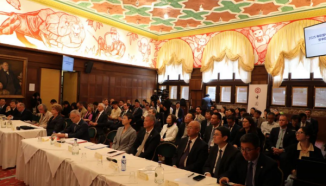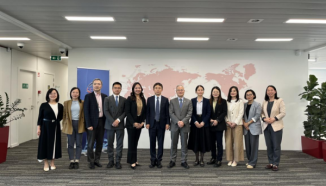Trapped in a “Compliance Maze”: Chinese Firms in EU Face Dual Pressures of Politics and Soaring Costs
Latest CCCEU-Roland Berger report finds 81% cite rising uncertainty, yet resilience prevails: 53% increased EU revenue, 40% saw profits rise, and half plan to expand investment
Brussels, Belgium — November 12, 2025
The China Chamber of Commerce to the EU (CCCEU) and global management consultancy Roland Berger today jointly released the Chamber's seventh flagship publication, Weathering Challenges, Sharing Success - CCCEU Report on the Development of Chinese Enterprises in the EU 2025/2026, in Brussels.
The report reveals that "uncertainty" remains a defining feature of Chinese enterprises' operations in Europe. According to the survey, 81% of companies perceive rising unpredictability in the EU business environment. Many point to the growing politicization of commercial issues and dense regulatory rollouts that have created a "compliance maze." Enterprises call for a fair, transparent, and predictable market environment to restore confidence and facilitate stable growth.
Based on four months of surveys and in-depth interviews with 205 Chinese companies and organizations operating in the EU, the report urges both sides—on the occasion of the 50th anniversary of China–EU diplomatic ties—to take concrete steps to rebuild trust. It urges the hosting bloc to use the 50th anniversary of China–EU diplomatic ties to implement practical measures that strengthen cooperation, while avoiding an overextension of the "economic security" agenda that could hinder commercial collaboration. The report presents 336 concrete initiatives and policy recommendations to improve the EU business environment and strengthen China–EU cooperation.
Shifting from Complementarity to Co-shaping
In his keynote speech, Liu Jiandong, Chairman of the CCCEU, noted that China–EU economic relations are evolving from "complementary interdependence" to "strategic co-shaping." For Chinese enterprises, Europe has moved beyond a traditional export destination to become a hub for technological innovation, a proving ground for global brands, and a key arena for standards alignment.
He outlined three emerging trends: a "dual-track uplift" in trade structure where China's new-energy products and Europe's advanced equipment remain highly complementary; a rapid shift in investment models toward ecosystem embedding; and a growing need for rules-based dialogue. Despite six consecutive years of perceived headwinds, Liu emphasized that Chinese companies have shown strategic resolve and remain committed to the European market. He called for innovative dialogue platforms, deeper mutual understanding, and practical cooperation in green transition and advanced manufacturing to stabilize supply chains and foster mutual benefit.
Denis Depoux, Global Managing Director at Roland Berger, delivered a keynote speech via video call. "Success hinges on a delicate balance," he said, adding that Chinese firms must leverage their formidable domestic advantages—such as unrivalled manufacturing scale, rapid innovation, and robust supply chains—while ensuring these strengths are not diluted overseas. After a first wave of export-fueled success, driven by product superiority, speed and cost advantage, competitors are catching up and a deeper understanding of European customers' preferences is required.
China–EU Trade Relations Steady Amid Headwinds
China and the EU remained each other's second-largest trading partners in 2024. According to Eurostat, bilateral trade in goods reached EUR 732.2 billion, down 1.6% year-on-year amid weak global demand yet demonstrating resilience. High-tech products accounted for 26% of total trade, while machinery and transport equipment made up more than half of total exchanges. Household appliances saw strong two-way growth (EU imports from China reached EUR 16.3 billion, up 27%; EU exports to China also rose 27%).
Data show that Chinese FDI into Europe rebounded significantly in 2024, with investment focus shifting eastward and Hungary capturing a substantial share. This surge was underpinned by historic levels of greenfield investment, the vast majority of which flowed into the NEV and battery value chain. By the end of 2024, nearly 3,000 Chinese-invested enterprises were operating across all 27 EU member states, employing more than 260,000 local staff.
Despite macroeconomic pressures, Chinese enterprises demonstrated strong resilience. Over 80% of surveyed companies reported stable or improved business performance in 2024, with 53% recording revenue growth in the EU market. From a profitability perspective, 40% saw higher profits, compared with 19% that reported declines.
Looking ahead, optimism is rebounding: 62% of respondents expect revenues to increase in 2025, while only 14% anticipate a decline. Half of all surveyed firms plan to expand investment in the EU in 2025, and none reported plans for a "significant reduction."
Companies cited key drivers for their continued engagement in Europe: building global brand recognition, tapping into emerging industries, leveraging the EU's industrial strengths, strengthening manufacturing and operational capabilities, and enhancing supply-chain diversification. Examples highlighted in the report include Bank of China (Europe) SA's ESG initiatives, COSCO Shipping (Europe)'s green practices, China Three Gorges Europe's ESG commitments, CATL's social responsibility programmes in Germany, and Henan Civil Aviation Development and Investment Group's "Air Silk Road" project. These cases exemplify the principle of "In the EU, For the EU," contributing to local innovation, employment, and sustainable growth.
Business Confidence Erodes as Uncertainty Persists
The overall rating of the EU business environment among Chinese companies declined for the sixth consecutive year, falling to 61 out of 100 in 2025 from 73 in 2019. More than one-third of respondents reported a clear deterioration, particularly in new energy, IT, and healthcare sectors. Core indicators such as the research environment, talent availability, and digital development continue to trend downward, while market-access barriers remain a major concern.
Rising labour costs and political factors are creating a "dual pressures" on Chinese enterprises in the EU. Labour costs are now viewed as the most pressing challenge, followed closely by geopolitical complexity and shifting EU and member-state policies toward China.
More than 40% of respondents said they had experienced differential treatment because of their Chinese identity. Common issues include politically driven assessments during market access, longer approval times, fewer subsidy opportunities, and limited dialogue with authorities.
Balancing Economic Security and Openness
Chinese companies voiced concern that the EU's expanding economic security agenda has intensified the politicization of commercial issues. About 90% of surveyed firms said "de-risking" and "economic security" policies have negatively affected their operations, mainly through stricter investment screening, market-access barriers, and greater policy uncertainty.
Following the implementation of the Foreign Subsidies Regulation (FSR) in July 2023, the EU has, as of September 2025, launched several investigations into Chinese companies. The scope of these probes has broadened beyond the clean energy, locomotive, and security equipment sectors to also include the automotive industry. Investigations have taken different forms: some were in-depth probes conducted in merger and public procurement cases, while others were initiated ex officio by the European Commission.
Trade-defense actions also continue to intensify. By end-2024, China remained the top target of EU trade-defense measures, involved in 85 of 199 active cases—over 40% of the total.
Against this backdrop, the EU's anti-subsidy investigation into Chinese electric vehicles has introduced new uncertainties to bilateral economic relations. According to the surveyed Chinese companies, the measures have affected Chinese automakers' performance and confidence while sparking internal EU debate about the implications for Europe's economic and green-transition goals. Companies hope both sides will address differences constructively, for instance through a "price undertaking" arrangement to help restore stability.
In the digital sector, 81% of respondents expressed concern over the politicisation of cybersecurity assessments. Since 2023, when the European Commission's 5G toolbox report labelled Chinese firms "high-risk vendors," that classification has been echoed in multiple EU policy documents and national legislations. By late 2024, 13 EU member states had introduced restrictions on Chinese participation, raising fears that forthcoming ICT security frameworks could further expand "de-risking" to sectors such as smart vehicles, AI, and new energy.
In public procurement, the European Commission's 2025 implementing regulation under the International Procurement Instrument (IPI) prohibits Chinese enterprises from bidding for EU medical-equipment contracts above €5 million. The measure also restricts subcontracting and product-origin ratios, affecting 36% of surveyed firms.
Despite these headwinds, most Chinese enterprises are responding proactively: 41% are partnering with local firms, 35% strengthening internal compliance training, and 24% conducting data and information audits. Only 8% are considering scaling back or postponing activities, underscoring long-term commitment to Europe.
300+ Recommendations for China-EU cooperation
The report proposes 336 recommendations across ten dimensions—politics, economy, industry, talent, research, infrastructure, market access, digitalization, sustainability, and culture—aimed at fostering an open and predictable EU business environment and strengthening China-EU cooperation.
It urges the EU to avoid over-politicising or over-securitising economic issues and to strengthen institutional dialogue. The China–EU relationship, it concludes, remains structurally complementary: Chinese enterprises are active contributors to Europe's green, digital, and innovation transitions and are essential partners in advancing the EU's sustainable-development goals.
Marking the 50th anniversary of China–EU diplomatic relations, the report calls this milestone a new starting point for rebuilding mutual trust. Chinese enterprises encourage both sides to expand cooperation in trade, technology, education, culture, and climate action—and to pursue cooperation rather than confrontation, jointly upholding multilateralism and free trade while tackling global challenges.
The report concludes that continuous engagement and deepened cooperation will remain vital to realising the full potential of China–EU economic relations in the years to come.

 Login
Login Login
Login 2025 China-EU Business Forum Draws 100+ Companies
2025 China-EU Business Forum Draws 100+ Companies CCCEU Holds Automotive Working Group Meeting to Discuss Developmentand Compliance Issues in Europe
CCCEU Holds Automotive Working Group Meeting to Discuss Developmentand Compliance Issues in Europe



